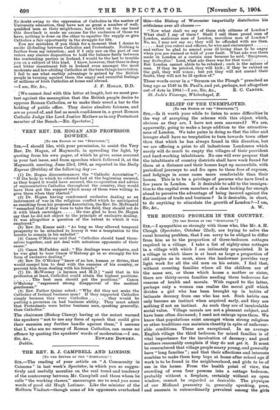[To THE EDITOR OF THE "SPECTATOR.," J SIR,—I should like,
with your permission, to assist the Very Rev. Dr. Hogan, of Maynooth, in spreading the light, by quoting from his own paper, of which he gives some account in your last issue, and from speeches which followed it, at the Maynooth meeting, June 23rd, 1904, as reported in the Daily Express (Dublin) of the following day :— (1) Dr. Hogan discountenances the "Catholic Association " : "If the body to which he referred had at the beginning secured, as they hoped it would have secured, the co-operation and advice of representative Catholics throughout the country, they would have then got the support which many of them were wining to give them when they started." (2) Dr. Hogan having condemned exclusive dealing as an instrument of war in the religious conflict which he anticipated as resulting from his proposed Association, the Rev. Dr. McDonald "remarked that if they were to take the field, they should not do
it with blank cartridges He was glad to hear Dr. Hogan say that he did not object to the principle of exclusive dealing. It was altogether a question of the extent to which it was employed." (3) Rev. Dr. Keane said: "As long as they allowed temporal prosperity to be attached to heresy it was a temptation to the heretic to remain in his unbelief."
(4) Canon O'Mahony said that "Catholics should band them- selves together, and not deal with notorious opponents of their cause."
• (5) Canon McFadden said: "His dealings were exclusive, and he was glad to hear Canon O'Mahony go in so strongly for his form of exclusive dealing."
• (6) Bev. Dr. O'Hickey "knew of no law, human or divine,.that would compel him to deal with the enemies of his country, or prevent him from dealing with his friends." (7) Dr. McWeeney [a layman and M.D.] "said that in his profession at least, Catholics could attain the highest positions. . ...The best men should get the positions." Canon O'Mahony "expressed strong disapproval of the medical gentleman."
(8) Rev. Father Quinn asked : "Why did they not make the Catholics of Ireland business men? If they supported Catholics
simply because they were Catholics they would be putting a premium on bad business ability. They must admit that Protestants were better business men, speaking generally, than Catholics."
The chairman (Bishop Clancy) having at the outset warned the speakers "not to use any form of speech that could give their enemies any further handle against them," I assume that I, who am no enemy of Roman Catholics, can cause no offence by quoting the speakers' words of moderation.—I am,
Sir, &c., EDWARD DOWDEN.


























































 Previous page
Previous page